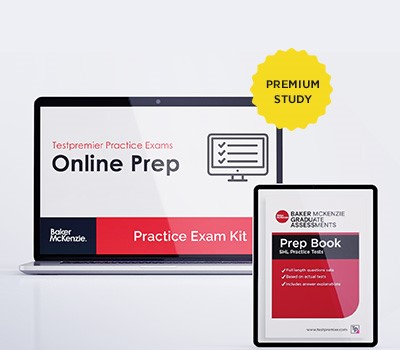
Deutsche Bank Online Practice Test
Landing a job at Deutsche Bank is a dream for many aspiring financial professionals. With a legacy of excellence and a reputation for innovation, Deutsche Bank sets high standards for its candidates. If you’re preparing for the Deutsche Bank Assessment, you’ll want to be well-equipped to succeed. In this blog post, we’ll guide you through the process and highlight the importance of the Deutsche Bank Assessment Practice Aptitude Test Pack for 2024.
Understanding the Deutsche Bank Assessment
The Deutsche Bank Assessment is a crucial step in the bank’s hiring process. It helps Deutsche Bank identify top talent by evaluating candidates’ aptitude, critical thinking, and problem-solving skills. The assessment includes various components, such as numerical reasoning, verbal reasoning, and situational judgment tests.
Why the Deutsche Bank Assessment Practice Aptitude Test Pack?
Preparing for the Deutsche Bank Assessment is essential to stand out in a highly competitive job market. The Deutsche Bank Assessment Practice Aptitude Test Pack is a valuable resource designed to help you excel in this assessment. Here’s why it’s a must-have:
- Comprehensive Coverage: The Practice Aptitude Test Pack covers all the key areas tested in the Deutsche Bank Assessment, ensuring you’re well-prepared for every aspect of the test.
- Realistic Simulations: The practice tests closely mimic the actual assessment, providing you with a realistic test-taking experience. This familiarity can significantly reduce test anxiety and boost your confidence.
- Detailed Feedback: After completing each practice test, you’ll receive detailed feedback and explanations for every question. This allows you to understand your strengths and weaknesses, making it easier to focus on areas that need improvement.
- Time Management: The Deutsche Bank Assessment is known for its time constraints. The Practice Aptitude Test Pack helps you refine your time management skills, ensuring you can answer questions efficiently during the actual assessment.
- Continuous Improvement: Use the test pack iteratively to track your progress. Regular practice will help you refine your skills and steadily increase your scores.
Tips for Success with the Deutsche Bank Assessment Practice Aptitude Test Pack
- Start Early: Give yourself ample time to practice before the assessment. Starting early allows you to address weak areas and build confidence gradually.
- Simulate Test Conditions: When taking the practice tests, try to recreate the actual test environment as closely as possible. Minimize distractions and time yourself to get a feel for the real thing.
- Analyze Mistakes: Don’t just focus on the number of questions you got right or wrong. Analyze your mistakes and understand why you made them. This is where the detailed feedback in the Practice Aptitude Test Pack becomes invaluable.
- Stay Calm: On the day of the assessment, stay calm and focused. Use the time management skills you’ve developed through practice to pace yourself effectively.
About Deutsche company
Deutsche Bank AG is a Germany-based investment bank and financial services company. The Company offers a range of investment, financial and related products and services to private individuals, corporate entities, and institutional clients. Its business activities are divided into three segments: Corporate & Investment Bank (CIB), which offers investment and transaction banking products and services for corporate and institutional clients; Private & Commercial Bank (PCB), which provides private, corporate, and wealth management clients with a broad range of products from standard banking services to individual investment and financing advice; and Asset Management (AM), whose investment capabilities span both active and passive strategies and an array of asset classes, including equities, fixed income, real estate, and sustainable investments.
Deutsche Aptitude tests formats: What to expect:
Deutsche mostly uses CEB/Gartner (SHL) style tests for its candidate selection. The sections on the assessments may include any of the following test sections, depending on the role that you applied to and also the country you are applying from:
- Numerical Reasoning
- Verbal Reasoning
- Inductive Reasoning
- Reading Comprehension
- Deductive Reasoning
- Situational Judgement Test
- Error / Data Checking Test
- Presentation
- Interview
- Personality Test
Sample Deutsche Bank Assessment Practice Tests and Worked Solutions.
GET THE PREMIUM VERSION
Deutsche Bank Graduate practice pack numerical reasoning
Question-1
Approximately what percentage of graduates and non-graduates are self-employed?
A. 10%
B. 14%
C. 17%
D. 22%
E. 23%
EXPLANATION Self-employed graduate = 210,000 Self-employed non-graduate = 198,000 and the total = 408,000 Total = 2,100,000 = 900,000 = 3,000,000 Approximate percentage = 408,000/3,000,000 x 100 = 13.6% ≈ 14% Answer: (A)
Question-2
If the number of graduates employed in Health is forecast to decline by 20% year-on-year while the number of non-graduates is forecast to remain the same, how many years will it take for non-graduate employees to outnumber graduate employees in Health?
A. 1
B. 2
C. 3
D. 4
E. 5
EXPLANATION 1st year decline by 20% in health for graduates = 20/100 x 315,000 = 63,000 315,000 – 63,000 = 252, 000 2nd year decline by 20% in health for graduates = 20/100 x 252,000 = 50,400 252,000– 50,400 = 201,600, 3rd year decline by 20% in health for graduate = 20/100 x 2101,600 = 40,320 201,600 – 40,320 = 161280, so if required 3 years. Answer: (C)
GET THE PREMIUM VERSION
Question-3
If the number of graduates employed in Education remains the same while the number of non-graduates increases by 15% per year, how many years will it take for the number of nongraduates to exceed the number of graduates employed in education?
A. 3
B. 4
C. 5
D. 6
E. 7
EXPLANATION 1st year 15% increase for non-graduate in education 0.15 x 117,000 = 17,550 117,000 17,550 = 134,550 2nd year 15% increase for non-graduate in education 0.15 x 134,550 = 20,182.5 134,550 20,182.5 = 154,732.5 3rd year 15% increase for non-graduate in education 0.15 x 154,732.5 = 23, 209.875 23,209.875 154,732.5 = 177,942.375 4th year 15% increase for non-graduate in education 0.15 x 177,942.375 = 26,691.35 26,691.35 177,942.375 = 204,633.73 5th year 15% increase for non-graduate in education 0.15 x 204,633.73 = 30,695.06 30,695.06 204,633.73 = 235,328.79 6th year 15% increase for non-graduate in education 0.15 x 235,328.79 = 35299.32 35299.32 235,328.79 = 280,628.11 7th year 15% increase for non-graduate in education 0.15 x 270,628.11 = 40,594.22 40,594.22 270,628.11 = 311,222.33 is the year 7th Answer: (E)
Question-4
What is the number of self-employed graduates as a proportion of the total number of individuals in Tarleton district?
A. 3%
B. 4%
C. 5%
D. 6%
E. 7%
EXPLANATION Self-employed graduate = 210,000 Total individual = 210,000 900,000 = 3,000,000 Proportion = 210,000/3,000,000 x 100 = 0.07 x 100 = 7%
Answer: (E)
Deutsche Bank Graduate practice pack Verbal Reasoning
In the past 12 months, benefit fraud has fallen by £½ billion to its lowest level for over a decade. The fall is equivalent to a 25 percent drop to 1.5 percent of the total £100 billion benefit bill. This spectacular fall follows permission for the benefits office to access Inland Revenue taxation data. Benefit officers can now immediately check to see if a claimant is working and claiming benefits intended only for those out of work. This new measure has led to over 80,000 people being caught making false claims. A similar initiative has also succeeded in a substantial cut in the level of fraud committed by claimants of housing benefits. Local authorities are responsible for the administration of this allowance which is awarded to the unemployed and low-paid to help with housing costs. Until recently local authority staff had been unable to access central government records to check the information provided by claimants. These checks have so far identified 44,000 claimants who have provided false information in order to make claims for allowances for which they are not eligible.
Question 1. By making it possible to share information, over 120,000 cases of fraud have been detected.
A. True
B. False
C. Cannot tell
Question 2.
Ten years ago the level of benefit fraud was higher.
A. True
B. False
C. Cannot tell
Question 3.
Only the unemployed should legitimately claim these benefits.
A. True
B. False
C. Cannot tell
Question 4.
The tone of the passage suggests that these reductions in fraud are a good thing.
A. True
B. False
C. Cannot tell
Question 5.
A year ago the level of benefit fraud totaled £2 billion.
A. True
B. False
C. Cannot tell
Answers
Question 1. A, Explanation: 80,000 by benefit officers and 44,000 by local authorities;
Question 2. B, Explanation: The passage states that the new lower total was the lowest for 10 years so the level must have been lower 10 years ago;
Question 3. B, Explanation: Housing benefit is also awarded to the low-paid;
Question 4. An Explanation: In the passage, the fall in false claims is described as spectacular;
Question 5. An Explanation: The passage states that the £½ billion drop is equivalent to 25%, so the level of fraud 12 months previously would have been £2 billion. 50 Ultimate psychometric tests

